Saptapadi
1961
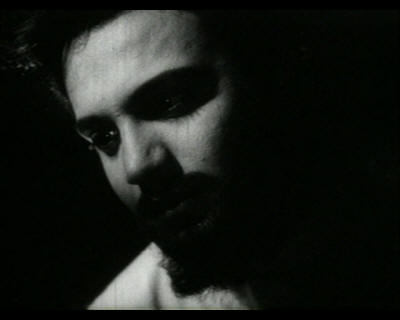 Director: Ajoy Kar
Director: Ajoy Kar
Writer: Tarashankar Banerjee
Awards: 1 win & 1 nomination
(Credited cast)
Uttam Kumar...Krishnendu
Suchitra Sen...Rina Brown
Chhabi Biswas...Krishnendu's Father
Chhaya Devi...Rina's mother (ayah)
Utpal Dutt...Othello (voice)
Tarun Kumar...Krishnendu's friend
Padmadevi...Krishnendu's mother
Pahadi Sanyal...Doctor at army camp
Saptapadi is a tale of redemption.
The soul enters into the body, into flesh and blood, and forgets its real identity, losing its true Self in the labyrinth of the temporal illusory hologram. When we redeem something, we literally buy it back. When we ‘atone’ we return to our original state of being ‘at-one’. We return to Union with the One. There is only One.
This soft mystical film can be seen as a romantic tragedy, filled with all the hopes and heartaches that accompany the sweet promises of true love. While on another level Saptapadi can been enjoyed as an allegory, the tale of the struggle for the soul’s redemption.
In Sanskrit terms, Uttam Kumar’s character can symbolize Purusha, the calm observer within. While Suchitra Sen is Prakriti manifesting as the small identity self, our human nature, which after a mysterious long and arduous journey must find its way Home again.
The God-within never stops loving us no matter what we do. Our true Self within is eternally forgiving - for we are that Self. The God-within, the soul, the Atma, is always waiting patiently for us to Remember our true Home, to turn to that which we have always been and recognize that we are loved, that we are Love itself.
***
This is one of my favorite films - and even though I will here retell the story in the hopes of conveying some of the beauty, simplicity, and meaning found in Saptapadi, I encourage you to see this film for yourself to enjoy the wonderful nuances of Ajoy Kar’s directing, the marvelous expressiveness in the faces of Uttam Kumar and Suchitra Sen, and the artful use of shadows and light to convey subtle emotions in the frame compositions.
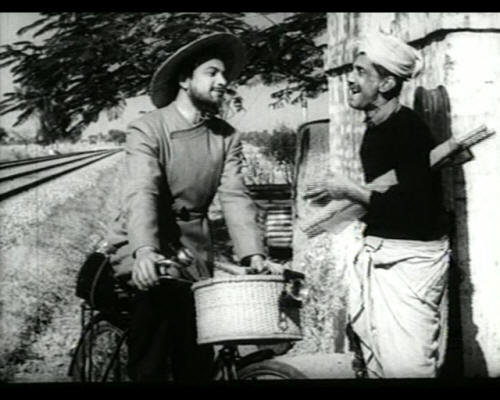 Saptapadi opens with a country doctor riding his
bicycle down dusty rural lanes to tend his patients, the sick and the poor. He
passes soldiers on the road - there’s a war going on and bombers fly overhead.
Some English soldiers drive by him and wave at him, their jeep kicking up dust.
Saptapadi opens with a country doctor riding his
bicycle down dusty rural lanes to tend his patients, the sick and the poor. He
passes soldiers on the road - there’s a war going on and bombers fly overhead.
Some English soldiers drive by him and wave at him, their jeep kicking up dust.
Our doctor, Uttam Kumar, arrives to check on the son of the village station master - whose job it is to flag the trains on. Happily his son is well and the poor man is so relieved that he says to the kind physician:
“You are a messiah for the poor! God shall bless you!”
Our humble doctor answers: “Where is that God? You are my God!”
Thus is the first moments of the film we come to understand that Uttam Kumar’s character, the doctor, has gained a level of understanding rare in this world. He is an enlightened being who sees God everywhere in every man, woman and child.
Riding through the night down dirt roads, Uttam returns to his small village hospital, which is little more that a crudely built makeshift clinic. The patients are lying crowded together in a room and even though he has made a long journey on bicycle, the doctor quietly checks on each one. He is a man who is evidently strong, calm, and at peace with himself.
A car arrives at Uttam’s rustic clinic with a drunken woman. She’s in an army uniform, lying face down, and unconscious from alcohol. Uttam turns her over and sees her face. He freezes, shocked to see the love of his life lying in an alcoholic stupor, sweating and disheveled in his arms. Stunned at seeing her again after so much time has passed, he walks out in a numb silence.
Standing outside in the night’s deep shadows, pain overwhelms him. Memories of their happiness together flood his heart and mind. Bittersweet memories pull him back - back to his youth, to happier times, to college.
Uttam first sees her at a soccer game. Suchitra Sen’s character is standing, cheering the game with intense enthusiasm. She’s for the other side, the opposing team. A rather boisterous, confident, even a bit noisy gal, she’s angry when Uttam scores a goal and cheers when he falls in the mud.
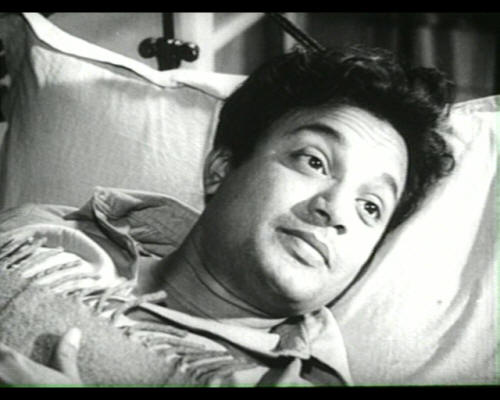 But the fellow Uttam portrays is one of those
blessed young men with the kind of boundless optimism and natural self-esteem
that is born of a mother’s unconditional love. He smiles at the girl’s jeers,
finding her a challenge. Uttam Kumar has the million-dollar smile and his
character is that of the all around winner!
But the fellow Uttam portrays is one of those
blessed young men with the kind of boundless optimism and natural self-esteem
that is born of a mother’s unconditional love. He smiles at the girl’s jeers,
finding her a challenge. Uttam Kumar has the million-dollar smile and his
character is that of the all around winner!
Suchitra’s friend is hurt in the game and she blames Uttam calling him “a hooligan - a goonda (thug) - and a brute!” Showing her passionate temper, she threatens Uttam rather absurdly and says that God will punish him - but Uttam smiles and replies that he does not believe in God. Our hero has not yet in this youthful moment found his enlightenment.
Of course the fiery hostility between these two is bound to draw them together. Suchitra’s character - Rina - is said to be half-English and half-Indian. The girl is even a bit arrogant and condescending. She actually calls Uttam an uncultured “blackie” and a stupid idiot.
Fate however draws them together in a school play - the death scene in Othello. Rina (Suchitra) plays Desdemona and once these two get up close, the chemistry between them is irreversible. She is bold over by the intensely powerful performance he gives as Shakespeare’s Othello. There is more to this man than she first saw. Like two magnets, the couple surrender their initial hostility to love-struck joy!
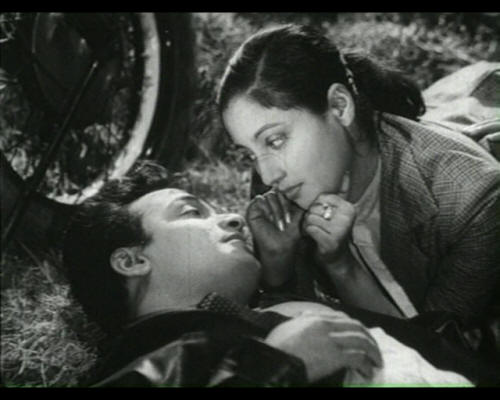
Uttam’s character - Krishnendu - excels at school and finishes at the top of his class. He’s that guy who can do anything and succeed. Our two lovers eventually decide to marry. At this point in the film there is a song which in my view is one of the most joyous moments in film history! The two are riding down a winding road, off to ask her father’s permission to marry. All the hopes of youth are wrapped up in Suchitra and Uttam's’ glorious carefree smiles as they sing, fearless, riding blissfully on the road of life together.
La-la-la-la!
If this path does not end,
how would it have been?
You tell me!
If this world had been a land of dreams,
how would it have been?
You tell me!
In a plain we shall sleep on the floor,
In the shade of merry laughter.
It would be nice if my mind gets mixed with merry laughter!
If this world had been a land of dreams,
how would it have been?
You tell me!
La-la-la-la!
In the blue sky beyond those distant boundaries,
I know not why I am lost in the sky today.
If my heart keeps singing these tunes ...
If this world had been a land of dreams,
how would it have been?
You tell me!
La-la-la-la!
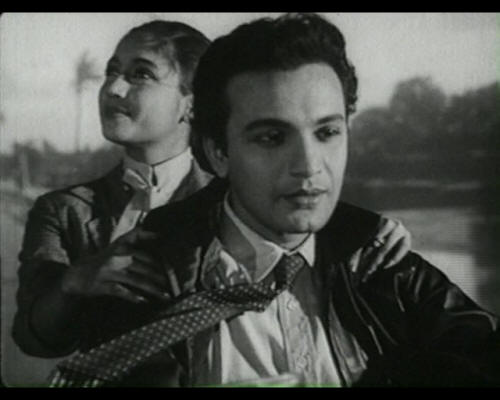
Watch the film clip on youtube:
http://www.youtube.com/watch?v=UN15rNGubQs
Rina’s English father does agree to the marriage on the one condition that Uttam/Krishnendu will convert to Christianity. Rina is Christian, but she doesn’t feel it is right for Krishnendu to give up his own traditions for her. Our hero tells her: “I believe in only one religion - the religion of mankind. There is no difference between a temple or a church in that religion.” So we understand that Krishnendu already has a more enlightened perspective.
However the young man is well aware that his own father will not give his approval for the marriage, but Uttam/Krishnendu loves Rina and doesn’t care. He isn’t willing to lose her on account of religion. His father is a Brahman and a devotee of the goddess Kali. The father is played by Cchabi Biswas, the famous Bengali actor who was a favorite of the great director Satyajit Ray.
The day that Uttam/Krishnendu is in church converting to Christianity, Rina is dancing around her house arranging flowers and singing. She is happy beyond her wildest dreams!
Dead set against the marriage, Krishnendu’s father shows up at Rina’s door and argues with her. He tells her that as an Anglo she can have no status in his family. She argues for love. But the old man tells her that one day she will awake from her romantic dream and realize that she and Uttam have no community - in other words they will not belong anywhere in Indian society.
He begs her to give up Krishnendu. If she marries his son, the father swears he will never meet with him again - Krishnendu will be dead to him. Crushed and afraid, Rina gives in. The old man forces her to take an oath to move away from Krishnendu’s life and never see him again. The tragedy is set.
In the next scene we see the happy confident Uttam/Krishnendu arrive at Rina’s door. He has just converted to Christianity and is ready for marriage with his beloved. Rina begins to argue senselessly with him. She creates a false obstacle. She can’t respect a man who would give up his own traditions. Naturally she doesn’t mention the father’s visit or the oath he has forced her to take.
Throwing a contrived temper tantrum - “Don’t touch me!” - the fiery Rina tells Krishnendu to get out, get out, get out! She slams the door on him and in a heartbreaking scene, slides down the door onto the floor in a heap of pain and sorrow, sobbing in misery, tears flowing from her. Both hearts are destroyed on the old man’s pride.
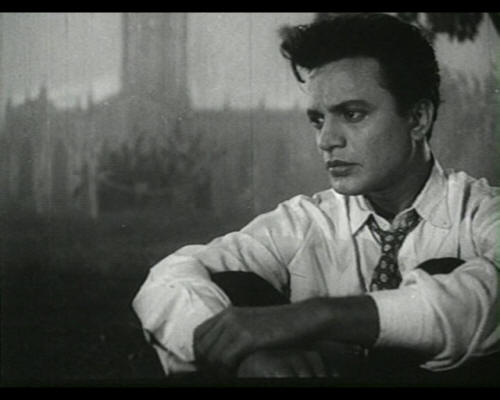 Uttam/Krishnendu goes into a state of shock. We
next see him sitting on the grass in front of the cathedral he has just been
converted in. The director does not tell us what he is thinking, but Uttam
Kumar’s wonderful eyes let us imagine. The pain is so great that the experience
has torn his heart open - there must be some reason, some higher purpose for
such intense pain.
Uttam/Krishnendu goes into a state of shock. We
next see him sitting on the grass in front of the cathedral he has just been
converted in. The director does not tell us what he is thinking, but Uttam
Kumar’s wonderful eyes let us imagine. The pain is so great that the experience
has torn his heart open - there must be some reason, some higher purpose for
such intense pain.
***
We return to the present, to the country clinic, and remember that Uttam has become a simple country doctor who tends to the poor. He has given up whatever opportunities that “first in your class” might have given him. He has become the humble servant of the God he once did not know.
Rina emerges from the infirmary, the signs of her drunken state still obvious. She approaches the Doctor to pay him something, and suddenly she recognizes him! The two have not met since she shut the door on his love - that terrible day when a part of both of them died. The horror of her present circumstances burns her through and through - and she flees the hospital.
The theme song the couple sang in hope haunts Rina’s thoughts. Suchitra is wonderful playing at the whisky bottle. Rina can keep the oath, but life is unbearable without Krishnendu - and so she drinks to forget. But after seeing him again, perhaps there’s not enough liquor in the world to help her forget the man she loves heart and soul.
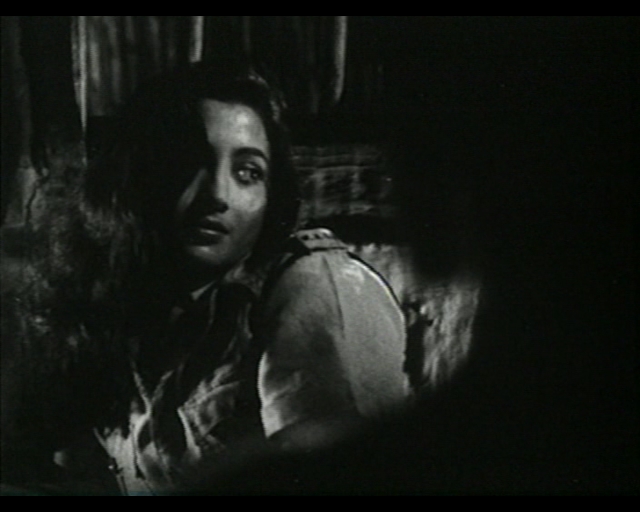
She cannot stay away from him and returns to the small hospital. The Doctor’s room is bare, sparsely furnished, with pictures of Jesus, the Indian saint Ramakrishna, and the Bengali genius Rabindranath Tagore. The good doctor leads the life of an ascetic.
Rina reminds Krishnendu that he could have been a great and famous doctor. He should go home and resume his career. But our hero has become a believer and taken an oath to serve God. While she has become a drunk who believes in nothing. Suchitra is quite convincing playing the hardened woman. She even brings a small bottle of booze along with her to help her through the moment.
She ridicules him and he looks at her with absolute love. She ridicules him, saying, “Don’t be as a stone age man and look at everything as God!” She’s bitter, hard, and compelled to tell him her story.
The day after she left him, she had wanted to become a nun. Remember that Rina was a Christian. But when she went to her father and told him that she had broken with Krishnendu and wanted to join her religion - the father told her that “she had no religion”! She is the illegitimate daughter of their Indian maid, she is a moment of weakness on the part of the English father who was secretly hoping to be rid of his mistake - meaning Rina. He admitted that he had even thought of killing her to get rid of his ‘sin’!
That day Rina lost her temper and threatened her father. The Indian maid servant had always been kind and loving to Rina - and now Rina demanded that the old man marry her real mother. Stereotypically British, the father is coldly drinking Scotch and in anger pulls out a gun. As the argument escalates, he fires wildly and accidentally kills the maid, Rina’s mother. Rina tells Krishnendu that her father is in prison.
In one terrible day Rina’s world crashed down around her. First she lost Krishnendu because of his father and then she lost her mother because of her father. Uttam/Krishnendu listens with loving eyes. He still loves her. Neither time nor circumstance, not even her rejection of him can alter the love he feels in his heart for her. He offers her wisdom:
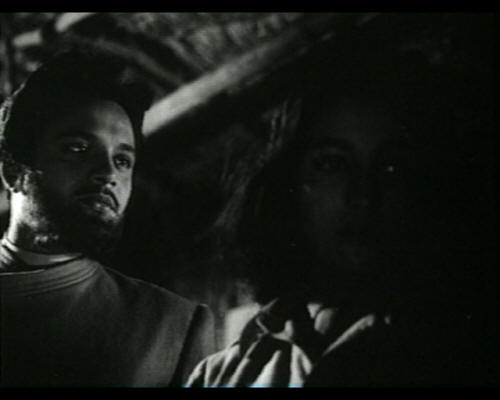
“Rina, the human life, the source from which it is created, there is no cast there. No religion. In every one of us equally God is present to be Self-Realized.”
He smiles at her so lovingly. He knows the truth. Vasudeva sarvam iti. God is present in every man, woman and child - ubiquitous, waiting to be Recognized.
Rina remains unmoved, trapped in her pain. She swears that Christ is dead for her. And then, she sees her picture on the table next to his bed. She realizes that he has never forgotten her, never given up hope. But the oath hangs over her like a prison, the promise she made to his father - which Krishnendu knows nothing about. She cannot tell him. She leaves again.
***
Back at her army barracks, Rina heads straight for the whisky bottle. But the vagaries of war intrude on her misery and she must travel to a village to rescue an old woman who is blind and has been abandoned to die. Rina carries the old lady to her jeep and drives to the nearest field hospital - where as fate will have it, once more our star-crossed lovers are thrown together. The good doctor Krishnendu has been called to the front lines to tend the wounded.
Destiny will not leave these two alone and both are shocked at seeing each other. Krishnendu sees it as natural - he adores her. But Rina is bound by her promise to his father and runs out into the night, into the surrounding countryside which is being bombed by enemy planes flying overhead. Krishnendu follows her. Rina is frantic and in the ensuing chaos is wounded by one of the explosions. Uttam/Krishnendu carries her unconscious back to the hospital.
***
Rina wakes in bed. She is alive and bandaged. The nurse informs her that the doctor has told her to take good care of his “wife”! Rina is a bit dazed and bewildered. Krishnendu comes into the room smiling, holding a letter he has received from his father admitting that he has been a old fool. He has misjudged Rina and releases her from the terrible vow that has caused so much misery.
Krishnendu hands Rina the letter, and she cries and cries. Life has been so cruel. Krishnendu shines his loving smile down upon her tears. Trembling, she confesses her fears. After what she has done, how she has lived - can she find her way back to peace? She says, “I have lost everything - my religion, faith, affection and love.”
Slowly, deeply, lovingly, Uttam/Krishnendu assures her - “You have lost nothing. You still have everything!” He loves her unconditionally - no matter what!
***
In the last scene of the film we watch Krishnendu carry Rina in his arms towards an ethereal sort of cathedral in the distant shadowy mist - which is appears as a metaphor of hope, renewal and redemption. In the light of dawn, he will carry her Home!
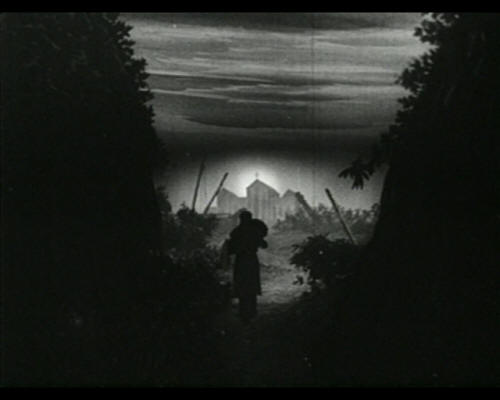
Krishnendu’s love is eternal - just as the soul (Purusha/Atma) that dwells within every man, woman and child waits lovingly, patiently for the temporal personality self to recognize its true nature and come Home. The Supreme Self that dwells within us all is always forgiving, always loving, and eternally present.
As Krishna says in the Bhagavad Gita II.72:
Even if a man gains stable understanding, true perception, only during his very last moments, his Self-Realization would still be of absolute significance - despite the fact that there is no time left for reshaping one’s life.
- translation from Krishna Chaitanya/KK Nair’s ‘The Gita for Modern Man’ Clarion Books, Delhi